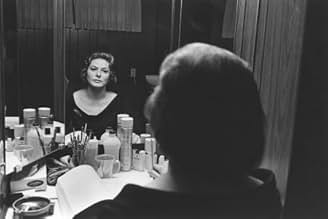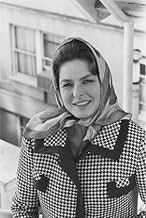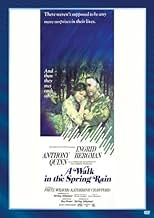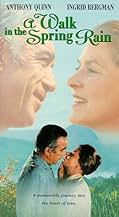IMDb RATING
6.0/10
1K
YOUR RATING
The Merediths move to an isolated farm. Mrs. Meredith and the neighbour Will Cade become friends and anticipate becoming lovers.The Merediths move to an isolated farm. Mrs. Meredith and the neighbour Will Cade become friends and anticipate becoming lovers.The Merediths move to an isolated farm. Mrs. Meredith and the neighbour Will Cade become friends and anticipate becoming lovers.
- Director
- Writers
- Stars
Tom Holland
- Boy
- (as Tom Fielding)
Michael Bullock
- One of men in fight crowd
- (uncredited)
- Director
- Writers
- All cast & crew
- Production, box office & more at IMDbPro
Featured reviews
A good-looking soap opera buoyed by veteran star power with a rather relentlessly melodious score by Elmer Bernstein and plush photography by Charles Lang; which when not taking in the vibrant Smoky Mountain local colour is concentrating upon the noble features of glamorous grannie, the eternally radiant Ingrid Bergman.
She's stuck with dry, pipe-smoking hubby Fritz Weaver (on sabbatical to write what sounds like a spectacularly dreary academic book), when fate sends her as her handyman sensitive hunk Anthony Quinn, who declares "You're full of love, ain't you Miss Roger?". What follows manages to be both melodramatic yet curiously passionless.
She's stuck with dry, pipe-smoking hubby Fritz Weaver (on sabbatical to write what sounds like a spectacularly dreary academic book), when fate sends her as her handyman sensitive hunk Anthony Quinn, who declares "You're full of love, ain't you Miss Roger?". What follows manages to be both melodramatic yet curiously passionless.
A Walk In The Spring Rain has Fritz Weaver and Ingrid Bergman as a college professor of political science going on sabbatical in the Great Smokey Mountains of Eastern Tennessee. Him for peace and quiet for a year so he can publish rather than perish, she for a little time away from being a mom, grandmother, and babysitter not necessarily in that order.
They take a cottage and the local handyman is Anthony Quinn doing a Smokey Mountain version of Zorba the Greek. He's married to psalm singing Virginia Gregg and she's no fun. Quinn has a son in Tom Holland who like his dad takes his action where he finds it.
The educated Bergman intrigues Quinn and he gives all kinds of hints as to his availability. But this one is doomed for all kinds of reasons.
I'm all for romantic stories with older protagonists and Quinn and Bergman fit the bill. The stars get good support from the rest of the cast. This is Bergman and Quinn's second film together and they acquit themselves well.
Still it won't be listed among the best for either.
They take a cottage and the local handyman is Anthony Quinn doing a Smokey Mountain version of Zorba the Greek. He's married to psalm singing Virginia Gregg and she's no fun. Quinn has a son in Tom Holland who like his dad takes his action where he finds it.
The educated Bergman intrigues Quinn and he gives all kinds of hints as to his availability. But this one is doomed for all kinds of reasons.
I'm all for romantic stories with older protagonists and Quinn and Bergman fit the bill. The stars get good support from the rest of the cast. This is Bergman and Quinn's second film together and they acquit themselves well.
Still it won't be listed among the best for either.
After Ingrid Bergman finally won a highly coveted Hot Toasty Rag award for her work in The Visit, she teamed up with Anthony Quinn again and earned another nomination for A Walk in the Spring Rain. They had such wonderful, intense energy together, and in this romance they both had the opportunity to play against type. Ingrid's character was a housewife who'd spent her life giving all of herself to other people. Tony played someone quiet, tender, and sweet.
Ingrid's husband, Fritz Weaver, is a professor, and for his sabbatical, they've decided to rent a cabin in the country so he can have the peace and quiet to write a book. Fritz is intelligent, opinionated, highbrow, and rather cold. Ingrid comes to life in her new country surroundings, and as she learns to love gardening, walking in nature, and caring for animals, she also develops a friendship with the cottage caretaker: Anthony Quinn. Tony is simple, earthy, and although he has passion, he isn't demonstrative. Both he and Ingrid are married, but they can't deny the deep feelings that continue to grow.
I know you're already out searching for a copy of A Walk in the Spring Rain, but there's a warning that comes with my recommendation. This is a drama. Yes, you'll see Ingrid looking cuter than she's ever looked, frolicking with baby deer and sheep, and Tony picks flowers for her; but something happens in this movie that's very upsetting. I won't tell you what it is or when it happens, but there is a "too good to be true" aura that surrounds the story. And when something seems too perfect. . . Well, just don't go into this movie thinking it's another Indiscreet. I loved the movie, and as a member of the Hot Toasty Rag board, I cast my vote for Ingrid, but I'm not sure I'd be able to sit through it again.
Kiddy Warning: Obviously, you have control over your own children. However, due to adult content, I wouldn't let my kids watch it.
Ingrid's husband, Fritz Weaver, is a professor, and for his sabbatical, they've decided to rent a cabin in the country so he can have the peace and quiet to write a book. Fritz is intelligent, opinionated, highbrow, and rather cold. Ingrid comes to life in her new country surroundings, and as she learns to love gardening, walking in nature, and caring for animals, she also develops a friendship with the cottage caretaker: Anthony Quinn. Tony is simple, earthy, and although he has passion, he isn't demonstrative. Both he and Ingrid are married, but they can't deny the deep feelings that continue to grow.
I know you're already out searching for a copy of A Walk in the Spring Rain, but there's a warning that comes with my recommendation. This is a drama. Yes, you'll see Ingrid looking cuter than she's ever looked, frolicking with baby deer and sheep, and Tony picks flowers for her; but something happens in this movie that's very upsetting. I won't tell you what it is or when it happens, but there is a "too good to be true" aura that surrounds the story. And when something seems too perfect. . . Well, just don't go into this movie thinking it's another Indiscreet. I loved the movie, and as a member of the Hot Toasty Rag board, I cast my vote for Ingrid, but I'm not sure I'd be able to sit through it again.
Kiddy Warning: Obviously, you have control over your own children. However, due to adult content, I wouldn't let my kids watch it.
10MacNessa
How easy it is for the children to take their parents for granted? The key moment in the film is when the mother character(Ingrid Bergman) asks her daughter, if she has ever thought about her mother as a person. This is in response to her daughter's request that she leave her Smokey Mountains paradise(and new found love), so that she can take care of her grandchild while her daughter can be free to pursue her own law career. At the same time Anthony Quinn- Bergman's lover, is presented with a similar situation with his brutish son, who eyes the blossoming relationship with growing hostility. This is probably the main theme in this wonderfully shot and pleasantly paced drama. By todays standards the ending may be a little sad, but its far more realistic.
First review above slams the people of the hills of Tennessee, assuming that they are backward, in-bred people. It's too late now, but I would have objected strenuously to that misguided garbage. The reviewer probably never met a real hillbilly, and no, "Deliverance" is not about real people, it's a fictional account invented in Hollywood. Please, you idiots, stop slamming mountain people. You don't even know any.
The problem I see with the movie is casting Anthony Quinn as a mountain man. I never saw any backgrounder that said he was an immigrant from Italy, Greece, or Mexico who moved to the mountains. With the character name they gave him, I assume they were seriously trying to palm Anthony off as a Tennessean. I did notice that they never actually showed his lips moving when he was delivering his lines: Anthony's accent wasn't identifiable as such, but it certainly wasn't TN mountains. I may well be missing something. But, one thing I'm not missing is the outright prejudice, and even hate, I see for the people of the mountains. Shame!
The problem I see with the movie is casting Anthony Quinn as a mountain man. I never saw any backgrounder that said he was an immigrant from Italy, Greece, or Mexico who moved to the mountains. With the character name they gave him, I assume they were seriously trying to palm Anthony off as a Tennessean. I did notice that they never actually showed his lips moving when he was delivering his lines: Anthony's accent wasn't identifiable as such, but it certainly wasn't TN mountains. I may well be missing something. But, one thing I'm not missing is the outright prejudice, and even hate, I see for the people of the mountains. Shame!
Did you know
- GoofsThe daughter's position at the kitchen table when Ingrid Bergman hits the cup and saucer with her hand.
- Quotes
Libby Meredith: Oh, God, Will. You still believe in miracles. But, I don't. I almost did. Oh, I came so close.
- ConnectionsFeatured in The Hollywood Collection: Anthony Quinn an Original (1990)
- SoundtracksTitle song
("A Walk in the Spring Rain")
by Elmer Bernstein and Don Black
Title song sung by Michael Dees
- How long is A Walk in the Spring Rain?Powered by Alexa
Details
- Release date
- Country of origin
- Language
- Also known as
- A Walk in the Spring Rain
- Filming locations
- Production company
- See more company credits at IMDbPro
Box office
- Gross worldwide
- $52
- Runtime1 hour 38 minutes
- Sound mix
- Aspect ratio
- 2.35 : 1
Contribute to this page
Suggest an edit or add missing content





























